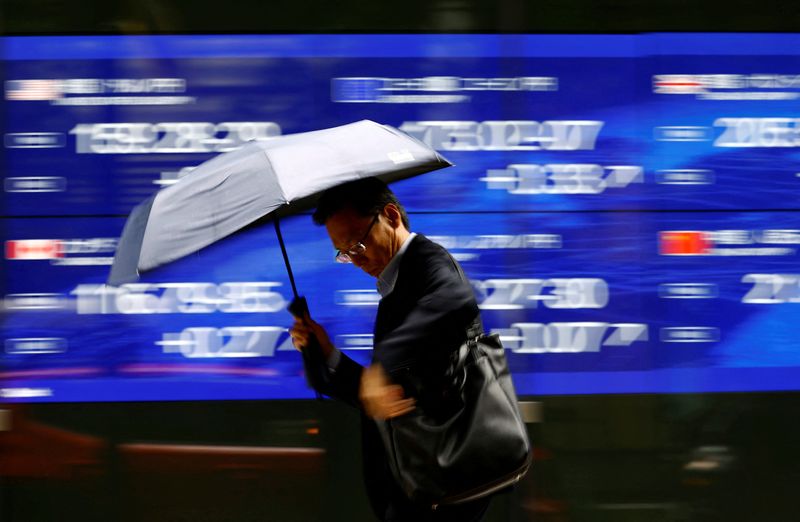By Brigid Riley
TOKYO (Reuters) -Japanese shares ended higher on Wednesday in a rollercoaster week of double-digit losses and gains that led the Bank of Japan's deputy governor to reassure investors there would be no interest rate rises amid market volatility.
Fears of U.S. recession risks and the unwinding of investments funded by a cheap yen sparked market stress, and a hawkish turn by the Bank of Japan (BOJ) last week raised alarm about how fast the central bank would tighten monetary policy.
BOJ Deputy Governor Shinichi Uchida addressed concerns on Wednesday, saying it won't hike rates when financial markets are unstable, sending the yen tumbling.
The Nikkei, which had fallen over 2% during early trade, rallied on the deputy governor's remarks to rise more than 3%. It closed up 1.19% at 35,089.62.
The broader Topix finished 2.26% higher at 2,489.21.
The moves follow a 10% jump in the Nikkei on Tuesday, its third biggest one-day percentage gain, as the index clawed back most of its losses from Monday's 12% plummet.
The double-digit plunge was the market's biggest single day rout since the 1987 Black Monday crash.
"As we're seeing sharp volatility in domestic and overseas financial markets, it's necessary to maintain current levels of monetary easing for the time being," Uchida said in a speech to business leaders in the northern Japan city of Hakodate.
While the yen had appreciated again since reversing on Tuesday from a seven-month peak hit at the beginning of the week, it slumped against the dollar following Uchida's remarks. [FRX/]
"His comments have become a trigger for slowing down the pace of unwind in the yen's carry trade," said Kentaro Hayashi, senior strategist at Daiwa Securities.
The Nikkei's moves are not directly driven by yen carry trades. However, a rising or volatile yen impacts corporate earnings and influences decisions by Japanese retail and institutional investors on allocations to their home markets.
MARKET ON EGGSHELLS
The BOJ's latest communications appeared to go over favourably with markets, and comments from Federal Reserve officials this week and more economic data have also soothed some concerns about the risk of a sharp economic downturn in the United States.
Wall Street's three main stock indexes edged up on Tuesday.[.N]
But market players will be keeping a vigilant eye on developments and investor confidence is likely to remain fragile for the time being.
"Volatility will remain high, with a side-way underlying trend as market expectations alternate between U.S. soft and hard landing scenarios," said Chi Lo, senior market strategist, Asia Pacific, at BNP Paribas (OTC:BNPQY) Asset Management.
Analysts said markets will be highly sensitive to any changes in job growth and inflation indicators going forward.
Given the BOJ's rate hikes and prospects that the Fed may cut rates as soon as September, policy divergence may also weigh on Japan's stock market, said BNP Paribas Asset Management's Lo.
But beyond near-term volatility, the direction of Japanese equities depends a lot on whether BOJ allows the virtuous inflation cycle to play out, he added.
"If the BOJ remains accommodative despite policy normalisation ... the Japanese stock market’s longer-term outlook should remain benign."
Among individual shares on Wednesday, the largest percentage gainers in the Nikkei were Disco (OTC:DSCSY) Corp, up 12.4%, followed by Japan Steel Works, which gained 11.63%, and Sumitomo Mitsui (NYSE:SMFG) Financial Group, up 10.24%.

Heavyweight SoftBank (TYO:9984) Group rallied 5.2% to give the index the largest lift.
The banking sector, which was one of the worst hit among the Tokyo Stock Exchange's 33 industry sub-indexes during Monday's slump, surged 7.9%.